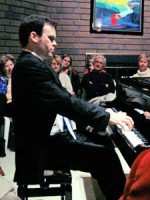Column Name
Title
Kimball Gallagher (M.M. ’04, piano) is taking his art—if not to the streets—into private homes all around the country with his current project, Piano Key. He’s no stranger to these types of venues, having used such intimate performances as a fund-raising vehicle to purchase a new instrument in 2001. Gallagher combines the 18th-century mode of presenting music with many of the tools of the technologically-driven 21st century to spread his passion for classical music—one living room at a time.
Body
What led you to the salon concept?
In 2001, when I was 20 years old, Jacob Deegan—whom I then knew as a friend of one of my professors at Rice University—started a concert series in his home in Houston and I was fortunate enough to be the first person to play. The evening, to which Jacob had invited his own friends, included dinner, socializing, and the concert. I had prepared comments on each piece and spoke, at that time quite timidly, about the background of the music and how I related to it as an artist. Of course, many musicians try out their recital programs casually in homes prior to a concert, but always as something in preparation for something public. Often audiences get more from these private concerts than the official public event. After the concert at Jacob’s house it gradually dawned on me that any home with a piano could be a legitimate concert venue. Also, like many artists, I had been hit with the “scarcity thinking” that goes on in classical music: there are “x” number of great pianists, and so few of them “make it,” etc. That way of thinking assumes that the only opportunities are the ones that already exist or are created by other people. Artists can and must (and ultimately do, in one way or another) create many of their own opportunities. I realized that, if one thinks of every home with a piano as a concert venue, then we probably don’t have enough musicians to go around.
Does your playing differ when you are in the salon environment or home versus the concert hall?
Not so much. Of course, pianists adjust tempos, articulation, pedal usage, etc. to whatever venue they are playing in. I feel more freedom in playing softly because I know that projection, per se, is really not an issue in most living rooms. What really changes in a home setting is communication with the audience. Of course, you can speak to them before and after the concert, but during the program I introduce the music and also encourage discussions and questions. The exchange creates a space for the audience to get to know me as a person and for me to know them as people, which increases the attention the audience gives the music.
What do you hope to accomplish by performing in people’s homes?
The main purpose is to revive the salon culture in the U.S. Ultimately I would like to build a nationwide group of hundreds of homes where concerts take place. I’m interested in putting classical music forward in this context, not as a cause to be “supported,” but as something with clear value that people will pay for, just like anything else of value. So this leads to the question, what exactly does a home concert provide? And what exactly am I, as an artist, selling? I believe that home concerts can provide the possibility for community and intimacy, warmth and friendship, education and enlightenment, entertainment and joy, passionate involvement, and access through music to the infinite.
How are you promoting these concerts?
I’m in the midst of scheduling and playing an 88-home concert tour. One concert per key. I am encouraging potential hosts to become part of this initial core group of hosts. I promote this idea by talking to people one by one, through my own mailing list, and now my new Web site and promotional video (www.pianokey.net). I try to find people who will host concerts, and they in turn invite their friends. This is an important part of the home-concert model I’m working with, because a room full of friends and acquaintances will create a warm, friendly concert atmosphere.
What was one of the most unusual experiences you’ve had when doing a salon concert?
I was once asked if I was single in the midst of a discussion about a Mozart sonata. Another time I was asked if I ever had danced the mazurka (I hadn’t, but I had just played one), and thankfully I admitted my ignorance, because the man who asked turned out to be Stefan Wenta, a highly esteemed Polish dance teacher. I still have to take him up on his lesson offer.





